UC Berkeley Web Feature
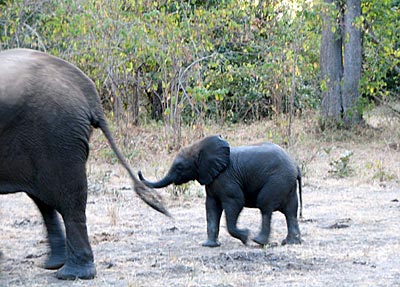 |
We
saw several baby elephants up close in Liwonde
National Park, but you really have to beware
if their parents feel threatened - they
will charge your minibus! (Photos by Jennifer Browning except where noted) |
Rain, baby elephants, bucket baths, and goodbyes
| About Student Journal 2006 [an error occurred while processing this directive] |
BALAKA, MALAWI — It's raining! I just stepped outside my "charlet" to see drizzle on the sand.
I have been here for 2 months. We are in the dry season and it doesn't rain here … ever. So you can imagine my joy at this unusual event. I changed research sites and am now in Balaka in the south. We stay in "charlets," originally spelled the normal way — chalets — but pronounced like "shallot" and acquiring an 'r' somewhere along the way.
Just as well, because chalet would be a bit of a misnomer for my current accommodations. At Mpaweni Motel, I do not lead the spotless, hot-showered, pampered life that I had grown accustomed to in Mchinji. Cleanliness is not one of Mpaweni's selling points, nor are hot showers. Thus it was here that I took my first bucket bath. But the accommodations are really not so bad, and I have enjoyed this site more than Mchinji. We're right next to a market and near the River Shire, which means Liwonde National Park is only a boat ride away.
One of our research villages borders the park; the survey teams have even gone in there looking for survey respondents. We grabbed the chance for a peek one Sunday.
It was beautiful. I had been so excited by the thoughts of elephants (one of which charged our car…twice!) that I was unprepared for the sheer beauty of the park itself. We went on a boat ride, during which we saw hippos, crocodiles, and elephants all at once — not to mention many species of birds and trees. On the boat with us was a Malawi television crew doing a documentary that seemed more like a promotional video about the park. They asked each person in our group about our reactions. I answered by expressing my feeling of peace as I sat in the boat with the motor off and looked at the gorgeous scenery around me. I did not say that every time I enter a park there are only azungu — white foreigners — and I wonder if the people we passed on the way, who've lived next to it their entire life, have ever seen what I am about to see. But then Julius, a law student at Chancellor College here who is working with us, said it all instead.
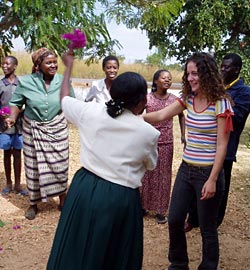 They sent me off to Balaka with a very sweet goodbye in Mchinji. In a circle they sang "A ku pita Jennifer" (Jennifer is going) and one by one danced with me in the center. |
|
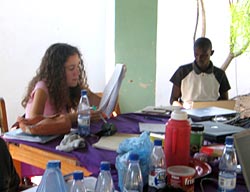 Checking questionnaires: we all worked under a gazebo at a large table with our laptops. Notice the huge amount of water bottles. When it was hot I drank five a day. |
|
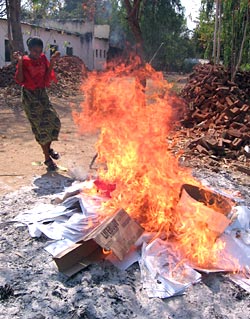 Californian recyclers should cover their eyes: we could not take all of the extra questionnaires with us, so we did what any Malawian would do; we burned them. I have seen worse here, like trash chucked out of minibus windows. |
|
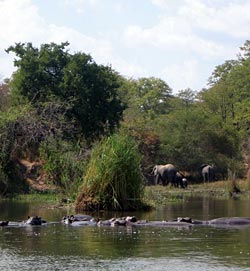 In the park, we saw hippos in the water — there's a crocodile to the left of the big reeds, and elephants on shore. |
|
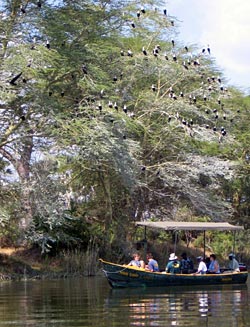 Seeing things from the water is wonderful, especially when you cut the motor, sit in silence, and watch the animals who seem oblivious to your presence. |
|
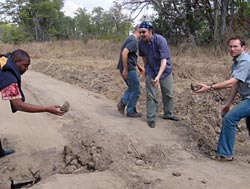 The dirt roads into the parks are very bumpy. This one was too much so for our minibus so we had to fill it in with rocks. |
|
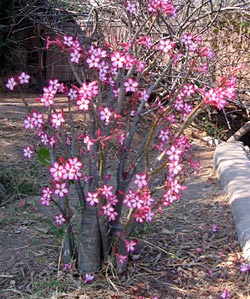 I only saw these trees in the park but found them stunning. |
The people living in the villages in the park's district are some of the poorest in Malawi. The south is the poorest, least educated region. In going to the villages here and in reading questionnaires, it has been shocking to see the difference with Mchinji in education level, so many no school's circled here.
Even more than its equivalent on paper, it really hit home on one of my first days in the field. We were in a Yao village. In Balaka, there are two main tribes, Yao and Chewa. I know some words in Chichewa, but very little Yao. I wanted to try a game anyway with the kids, one that had always worked in Mchinji.
I got out of the minibus and tried singing "head, shoulders, knees, and toes," but the children here were completely lost. After trying for 10 minutes, I finally asked them what standard (grade) they were in. None of them had been to school. I am convinced this is why teaching the song was so difficult. They were unused to learning English the way you would in school.
Comedy of errors at dawn
Right now, I am waiting for hot water for my bucket bath. There is a random system whereby some days you receive an unsolicited bucket of warm water at 6 a.m. and sometimes you do not. This seems to have no relation to what you request the night before. It is all one great comedy of errors. The grad students curse the water gods that wake them up in the morning, and the staff think they're providing a wonderful service, making sure they hear a "Zikomo" (thank you) before setting the bucket down outside and sometimes coming back 20 minutes later to make sure you really heard them since your bucket is just sitting there, while you've fallen back asleep.
Some of us become very irrational. One time I slept next door, in the room of a friend who was sick, and they knocked on our door at 5:45 a.m. I then heard them continue on to my door with water. I had this strong mischievous reaction, thinking "Haha, I'm not there and now they will not know what to do." And kept silent as the poor water toter knocked fruitlessly.
I am nearing the end of my trip, and I think it is this quotidian that will be strangest not to have in the United States. I have become used to going to my room exhausted at night, ready to fall into bed but motivating myself to take down the mosquito net and tuck it in everywhere. I am accustomed later in the night to having my hand brush against my net cocoon as I fumble around on the nightstand for my alarm clock, only to read it is 4 a.m. I often wake up to sweeping by my door at this hour. Mpaweni seems to employ mostly nocturnal sweepers. They are constantly brushing away with brooms made from tree branches. Someone told me that a well-cleared lawn, or in our case, a sandpit, is a sign of respectability.
A different kind of freedom
When I finally do get up, I walk past the guinea fowl squawking as they run, always in a herd — very beautiful, but very stupid, birds. As I enter the breakfast room, I know I will miss seeing all of the faces as we are served two pieces of bread, greasy French fries (called "chips" like the British do) and eggs. Malawians use a ton of oil in their cooking; we go through a liter a day. I have grown accustomed to the food at dinner and the occasional bad bag of rice, which for inattentive eaters can result in a stone painfully grinding a tooth. As James, our head supervisor said, "I think I have some rice in my sand." But overall, the food bought fresh from a market has been good, and having three large prepared meals a day in a country that had a famine only last year is a luxury.
There is another luxury. Being with good people. I feel fortunate to have met so many wonderful people on this trip and gotten to know them over the course of two months. Although I was glad to have them around, and they were glad to have well-paying jobs, this employment comes at a cost to them. I would wager that for most of them, "being with good people" means first and foremost being with their families. The majority of the supervisors and data team who are staying with us at Mpaweni are men. And many have a wife and young kids that they only see a few times — if that — throughout the course of our work. I realized that most people I know, including my parents, have jobs that do not separate them from their families for long. I will probably be able to have similar life, and this will not be something to take lightly.
I am returning to the U.S. very soon. This will probably be posted after I am back. I am told it will be a big adjustment. I think I will need time to absorb it all to really conclude any of this. However, I have been continually aware of and grateful for how much I have learned. I started out very concentrated on the community-based organization project I came to do, but fortunately I also had the chance to become more involved with the main fieldwork. I really have an appreciation for the challenges and constraints of doing research in a developing country.
When I return, I will have to re-examine the theories of development I have been studying as part of my major, Development Studies, in trying to determine what I think development means. I want to read more of the literature on Malawi, to better understand the things I saw, and thus am planning to write a senior thesis on some aspect of my research here. And it will be a privilege to do all this at Berkeley, after meeting so many people in Malawi who wanted to continue their education but could not.
I can end as I started. I feel extremely fortunate to have had this experience and hope to find a way to try to give back to Malawi and all of the wonderful people I have met here. There was something they would say to me often — which amused me then but touches me now: "Be free. You are most welcome."
